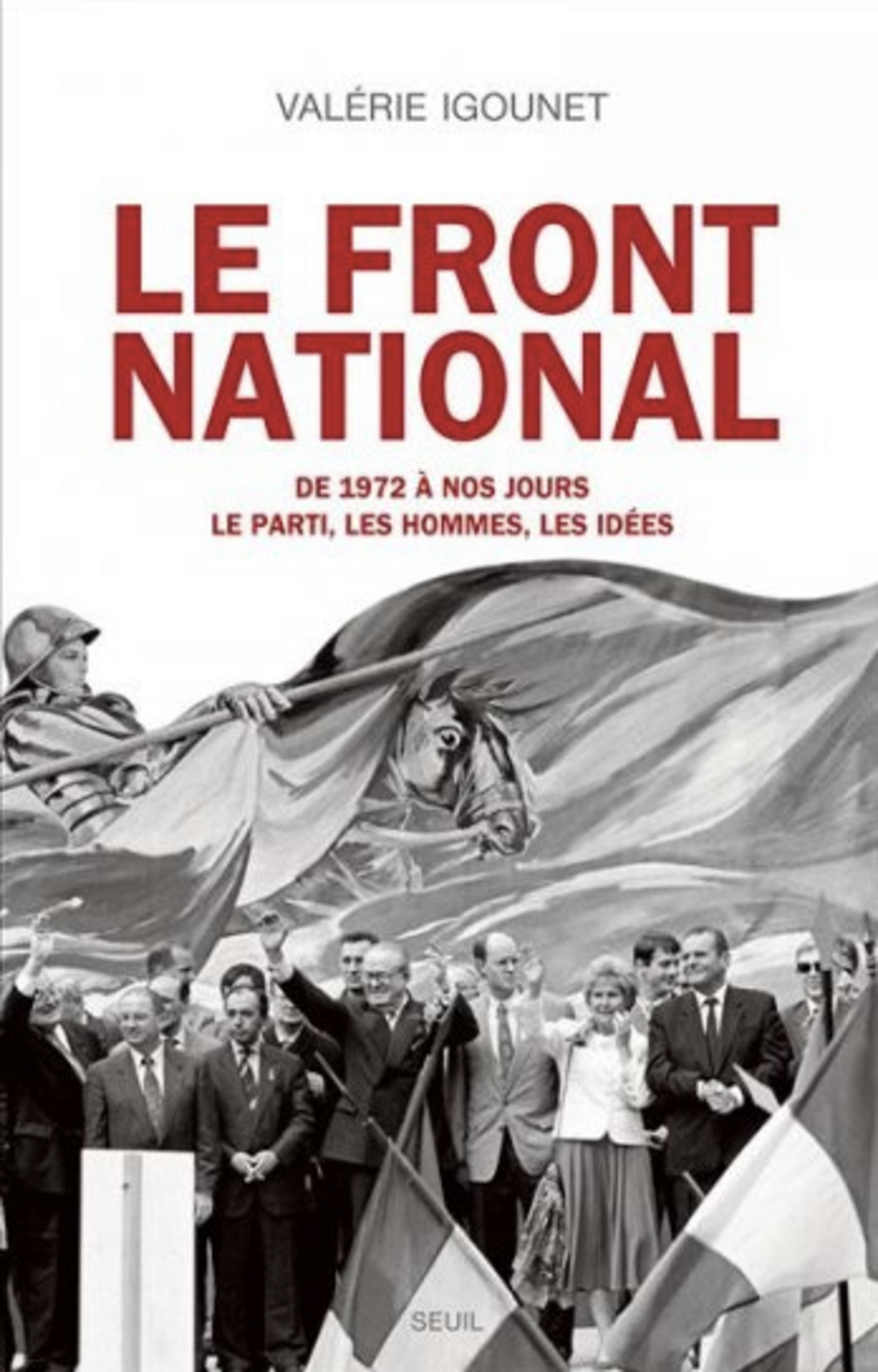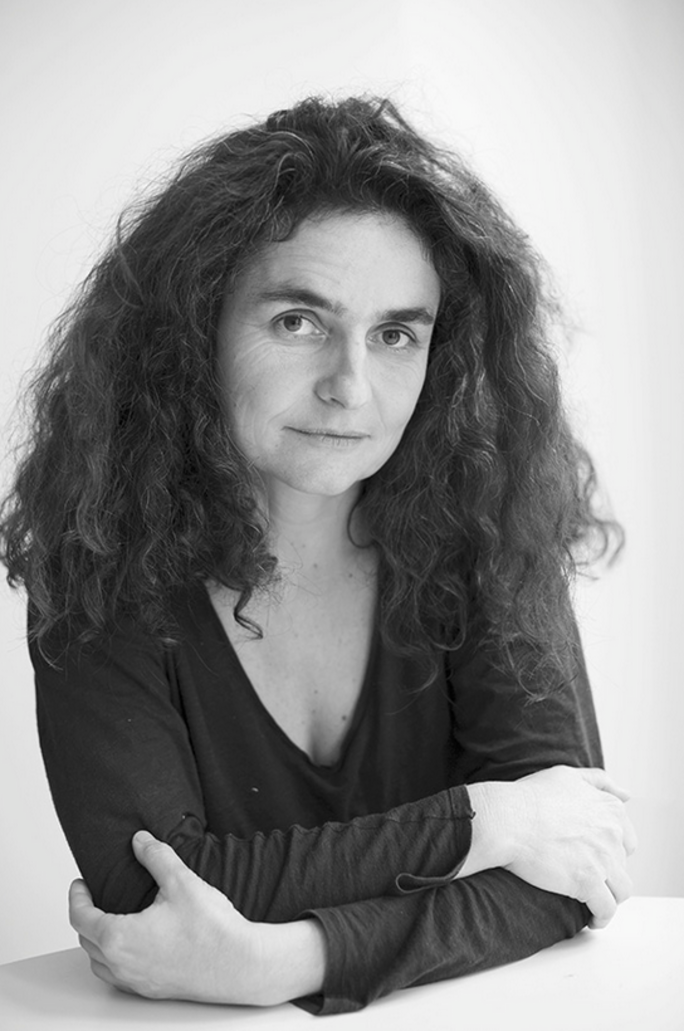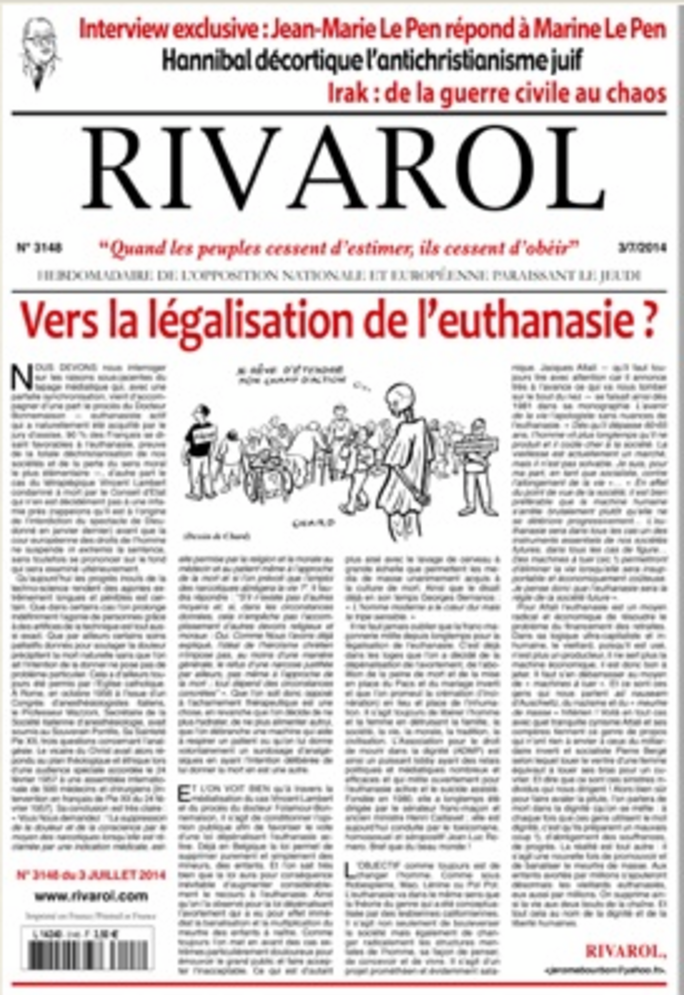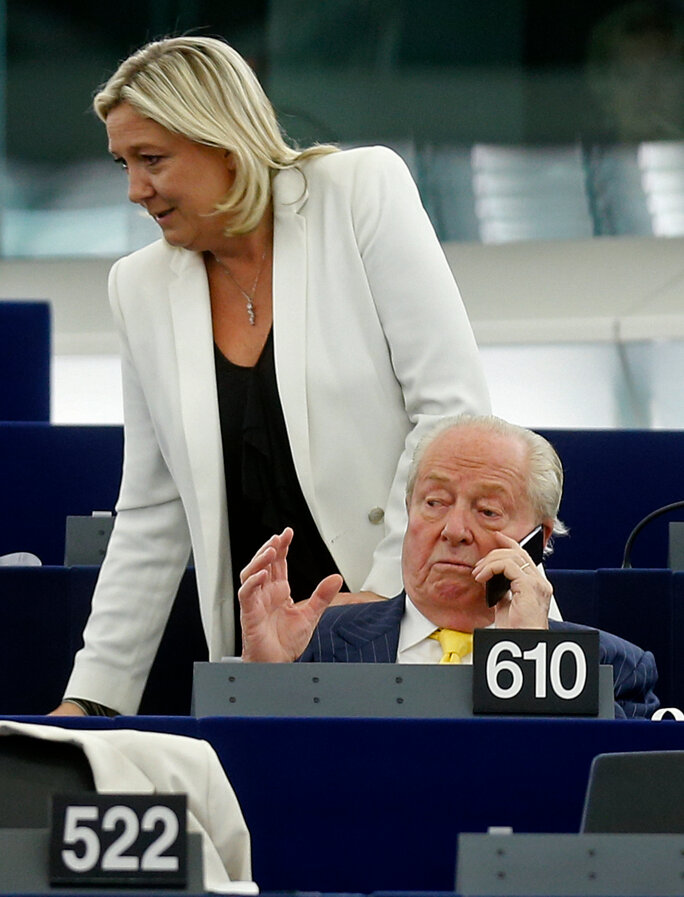The French Front National (FN) claims it has undergone a sea change since Marine Le Pen, daughter of party founder Jean-Marie Le Pen, took over at its helm in 2011. It has tried to shed its image as a neo-fascist party, instead presenting itself as anti-establishment, rooting for the common people and even contesting its far-right label.

However, in her recent book (see right) documenting the party's existence from 1972 to 2011 (1), historian Valérie Igounet concludes that the FN has not truly changed its spots. Her meticulously-researched tome, which took 18 months to write, includes numerous documents never before in the public domain and in-depth interviews with former FN officials. Igounet, a researcher with the Institut d'Histoire du Temps Présent (Institute of Contemporary History), part of the prestigious state CNRS research centre, is a recognised expert on the far right and the phenomenon of Holocaust denial, or 'negationism'. In an interview with Mediapart, below, she explores what she calls a state of permanent tension in today's FN, between Marine Le Pen's desire to bring it into the mainstream and the need to placate a historical fringe that has not disowned its overtly anti-Semitic roots.
An example of this tension emerged in early June, soon after the European elections, when Marine Le Pen criticised her father for his comments in an interview on the FN's website in which he said he would make “an ovenful” of Jewish anti-racist actor and singer Patrick Bruel and other critics. The father-daughter row continued in early July with an interview Jean-Marie Le Pen gave to Rivarol, an extreme right-wing publication, in which he said his daughter was guilty of a “mistaken analysis” in seeking to make the party less of a target for its critics.
------------------------------------------------------------------------
Mediapart: How does a researcher go about investigating the Front National? Do FN officials accept this kind of work and the normal rules of conducting research?
Valérie Igounet: I consider my work to be complementary to that of journalists. I wanted to write a book on the Jean-Marie Le Pen period, that is, from 1972 to 2011. I had access to internal written documents that have never been published. I consulted national archives, archives at the Paris police department and at the Interior Ministry. I also did numerous interviews, but I met more former FN officers than current ones, even if the party's vice-president and Marine Le Pen's partner, Louis Aliot, granted me several interviews and gave me access to certain parts of training sessions organised by the FN. Marine Le Pen did not want to meet me.
Mediapart: Was that a lack of interest on her part or a desire not to be confronted with the FN's history?
V.I.: She cited lack of time, but I made requests on several occasions, so I think it wasn't at all a lack of interest. My book looked at the FN's origins and she certainly didn't want to find herself face-to-face with a reality some of which she denies.

Enlargement : Illustration 2

Mediapart: What did you want to show in this book?
V.I.: In working with internal archives and interspersing them with oral accounts, I didn't write a history fundamentally different from what journalists have already said, but I did succeed in producing a more precise and documented history. For example, focusing on the FN's initial period allows us to see that the equation between immigration and unemployment does not date from 1978 and the influence of François Duprat, [Editor’s note, FN co-founder and its number two during the early years] but was present from the start, as certain posters show. However, the theme did not take hold at first.
Studying slogans, posters or graphic styles sometimes allows us to understand things that are not stated directly. We all knew that the FN logo was derived from the flame of the Italian fascist party MSI. But I was able to demonstrate irrefutably, based on the archives, not only that it was indeed borrowed, but also the fact that this fascist party had contributed financially to some of the FN's early campaigns. It's undeniable, even if Marine Le Pen has difficulty accepting this legacy.
Mediapart: You reproduce the various FN logos in your book. What do they tell us about the party?
V.I.: It is at once a graphic and ideological analysis: each new graphic style of the original flame reflects evolutionary changes in the party. The aggressive, spearhead-like flame of the Mégre period [editor's note, Bruno Mégret was a key figure in the FN for about a decade but split from the party in 1998] was controversial and only lasted a few months. The current one, softer and more feminine, corresponds to the image Marine Le Pen wants to give of the party, even if it was introduced before she took over the reins of the FN.
Mediapart: What was Jean-Marie Le Pen's aim when he created the FN in 1972? Did he essentially create a political brand?
V.I.: His main aim was to move the extreme right beyond the status of a small group, to which it had been relegated following the war with its lack of legitimacy because of Collaboration. To do that he wanted to create a real political party that took on the values of a “national, social and popular” right. But it would take a long time. For the first ten years the FN was a rudimentary political group. At its headquarters in Rue de Surène in Paris, the electricity was often cut off. A handful of hard-core militants would design posters and print them – sometimes in a bath – and go flyposting day and night – including Jean-Marie Le Pen, who was a real politician and believed in what he was doing. The Lambert inheritance in 1976 (2) would change the ball game and sully the history of what was still a small group and was to become a political party.
Mediapart: Did Jean-Marie Le Pen have a real desire to rise to power? It is often said that unlike his daughter, he did not pursue a real strategy to win power. Is that a misconception?
V.I.: It's not as simple as that. Before 1987 and what he said about the Nazi extermination camps being a “detail” of history, Jean-Marie Le Pen had hoped to see the FN reach power, even if there had already been some instances of so-called off-the-rails rants. From 1987 onwards there was an avalanche of them, and he could no longer hope to become president of the French Republic, as this overt anti-Semitism was incompatible with mainstream politics. All the former managers and officials of the FN stress this fundamental break in the history of their party.
Mediapart: At the beginning of the 1960s Jean-Marie Le Pen set up SERP, a record company that produced speeches and songs from the Collaboration and Nazism, notably a record to the glory of Marshall Pétain. Then it broadened the catalogue so as to be able to claim a certain eclecticism, and his company produced recordings of [Socialist Léon] Blum's speeches as well as Hitler's. Was that a precursor of the so-called strategy of de-demonization?
V.I.: This way of concealing their intentions is a strategy inherent to the FN since its creation. It can be found in the party's rhetoric, in its publications, its programmes, and in the names it chooses for its various structures and formations, such as the 'Rassemblement Bleu Marine'(3). They have always had a way of toning things down so as not to frighten people off and to attract voters from the traditional right, among others.
----------------------------------------------------------------
1. Le Front National de 1972 à nos jours. Le parti, les hommes, les idées ('The Front National from 1972 to today, the party, the people and the ideas'), by Valérie Igounet, Éditions du Seuil, June 2014.
2. Hubert Lambert was an alcoholic with severe liver disease and heir to a large fortune who gave generously to far-right causes. Jean-Marie Le Pen had befriended him, and a few months before his death in 1976, Lambert changed his will to make Le Pen the sole beneficiary. For more see here.
3. Rassemblement Bleu Marine (RBM) is a political coalition of anti-European nationalists formed by Marine Le Pen in 2012. Two of the candidates it fielded in 2012 parliamentary elections were elected as deputies.
'The public face of Marine Le Pen can be compared to a varnish that cracks regularly'
Mediapart: Nowadays the taboo is anti-Semitism, which can no longer be openly expressed, unlike a rejection of Muslims. Is it nevertheless still present?

V.I.: You can no longer be openly anti-Semite in the FN. The few people whose anti-Semitism has been featured in the media were expelled, and it is officially incompatible with the party’s new line. But when one sees Jean-Marie LePen choose Rivarol to explain himself about the “oven” he promised Jewish celebrities, a publication which is well known for its history of anti-Semitism and Holocaust denial, one can be dubious that anti-Semitism no longer exists at all in the FN. But this fringe does not have a majority in the party today.
Mediapart: Jean-Marie Le Pen’s rants are not “out of control” as is often written. Is there a sharing out of roles, even a tacit one, between the Le Pens to re-mobilise the heart of the FN electorate at a time when it's seeking to be respectable, or is it that Marine Le Pen cannot control her father?
V.I.: For me it's without doubt the second hypothesis. Re-mobilising the FN's historical electorate, the old anti-Semitic far right descended from Vichy, corresponded to the party's previous strategy, and Jean-Marie Le Pen's verbal excesses were aimed at that, among other things. Now the new generation has replaced the old and anti-Semitism is unacceptable. For the current leaders it's a serious political error.
The difficulty is to know how far Marine Le Pen is able to differentiate herself from her father. If he continues to go his own anti-Semitic way and she differentiates herself only half-heartedly, she risks losing the respectability she has won over the past ten years and he is unlikely to stop. If she is more abrupt with him and condemns him firmly, she could alienate someone who was president of the FN for 40 years and who still holds the party's purse strings.
Mediapart: Who are the radicals in the FN today? Some former members of GUD [an extreme-right student organisation], are able to work for Marine Le Pen without being in the FN, or are able to occupy key positions in Jeanne, her own micro-party. In parallel, we see attempts at entryism by members of Alain Soral’s movement or 'Identitaires'.
V.I.: They exist but they are not given any exposure. A section of them, notably militants from L'Œuvre Française, were thrown out of the FN because they were pro-Gollnisch [ editor's note, Bruno Gollnisch is the former FN executive vice-president who ran against Marine Le Pen for the FN presidency in 2011] and because their ideology no longer fitted with what we can call “Marine-ism”. But Soral's movement is still present in the Front National. I'm thinking of Frédéric Chatillon [editor's note, a former GUD leader and an unofficial adviser to Marine LePen] in particular, who is regularly at Marine Le Pen's side. We know that he is close to her and that he is the Front National's printer, but he knows how to keep in line, while someone like Alexandre Gabriac [editor's note, a FN regional councillor expelled in 2011] poses for a photo giving a Nazi salute. The public face of Marine Le Pen and her team can be compared to a varnish that cracks regularly.
Mediapart: It would seem that French Muslims have replaced Jews as the FN’s stated enemy…
V.I.: To go out and win new voters they had to abandon anti-Semitism. Louis Aliot told me in very explicit, clear, unambiguous terms: “De-demonization only involves anti-Semitism. Handing out tracts in the street, the only glass ceiling I saw was not immigration or Islam. Others are worse than us on those subjects. It is anti-Semitism that prevents people from voting for us. There is only that. Once you break that ideological block, you free the rest [...] Ever since I've known her, Marine Le Pen has been in agreement with that. She didn't understand why and how her father and the others did not see that this was the obstacle. She also had a life on the outside, friends who were poles apart on those questions, [Jean-Yves ] Le Gallou and others. It's the thing one should get rid of.”
Also, by the end of the first decade of the 21st century, the FN's enemy was no longer the Jew but the French Muslim. Islamophobia has supplanted anti-Semitism. The message is given a new context and can be propagated by these few words: the Islamist danger is opposed to the secular values advocated by our country and to the founding principles of the French Republic. It is also a way of getting round anti-racist laws: talking about Islam is a way of taking about immigration without transgressing the law.

Enlargement : Illustration 4

Mediapart: At the Tours conference in 2011, when Marine Le Pen took on the presidency of the FN, she said she was taking on “the entire heritage of the FN” and all the party's history. How can that be reconciled with her strategy of normalisation?
V.I.: Marine Le Pen never wanted to take on the entire history of the party. There's a major contradiction between what she said and what she does. But unlike other radical right-wing parties on a European scale, she does not truly accept a clear ideological break with the extreme right that derives from wartime fascism. Marine Le Pen's FN is balancing on an ideological wire: it needs to be allied with the Right to become a respectable party and a party of government, but it still tends to send extremist signals to conserve a heritage and keep a certain type of voter.
Mediapart: Looking at the FN of 1972 and the party of 2014, what fundamentally has stayed the same and what has changed?
V.I.: Some things have stayed the same. Certain key emblems endure, notably the anti-immigrant theme. The Le Pen name also represents a form of continuity linked to a history. But there is a sharp political break over anti-Semitism and Holocaust denial, and a more opportunistic break over neo-liberalism. Even if Marine Le Pen would not praise [former U.S. president Ronald] Reagan on economic matters as her father did, the FN is adapting, above all, to the regions where it's making progress. Steeve Briois [FN general secretary, local councillor and Euro MP] does not say the same things in Hénin-Beaumont [editor's note, a former mining town in the north of France] as Marion Maréchal-Le Pen [Marine Le Pen’s niece, elected as France's youngest MP in 2012] in Vaucluse [in the south of France]. In Nord-Pas-de-Calais, [Briois] uses social issues to mobilise people and is critical of neo-liberalism. In the south-east, the themes of immigration and insecurity are used more, for example. And that's logical.
Mediapart: Is there one FN in the south-east which is happy to be on the right of the right, and another in the north and east with a line of "neither the Right nor the Left"?
V.I.: There are real geographical differences. For those who observe the FN, this slogan “neither the Right nor the Left” seems like a veneer if you look at the line being developed in the south-east. But even if it is not politically pertinent, the slogan works. The reality is that the FN adapts to its audiences.
Mediapart: Can Marine Le Pen hold these two parties together on a permanent basis, one with its left-leaning line represented by Florian Philippot or Steeve Briois in the north and the east, and the other with no links to the Left, represented by Marion Maréchal-Le Pen in the south-east?
V.I.: To me it's a very precarious balance. I think when politics resumes after the summer break, things will be difficult for the FN. But the “Marine-ist” party officials have a good hold on the party. There are fundamental cleavages, whether with the father or the niece, but I don't think that will lead to new splits now. The pro-Gollnisch faction and the old traditional members have practically all left or died.
Mediapart: What differences do you see between the strategy of so-called 'de-demonization' that Bruno Mégret used and the one that Marine Le Pen is applying today?
V.I.: Hardly any. The policy of de-demonization was pushed by Mégret from 1989, despite the denials of current leaders. One aspect needs to be emphasised: the former FN general secretary [Mégret] didn't remotely follow the de-demonization strategy he advocated for the party when he was mayor of Vitrolles [in southern France], where he took tough measures in the area of cultural affairs and changed road names. But at that time the local authorities run by the FN were hotbeds of local autonomy. Today there's a greater osmosis between national and local policy. Instructions are laid down by head office. Now we need to look closely at the FN local authorities and the policies their mayors bring in.
Mediapart: The FN had not run any training sessions since the split in 1998 with Mégret, and it has now re-launched its training school. You were able to attend these sessions. What struck you most?
V.I.: I was only able to attend carefully-selected parts of the training and not the entire programme, but I think that would also have been the case for other parties. Having met the former trainers from the 1990s, I don't see real changes in the way they guide and 'manufacture' a good FN militant. Nowadays more emphasis is placed on the social dimension, but the targets, like journalists for example, are still the same, and certain former slogans have even been resuscitated.
Mediapart: The FN now controls 11 towns and has sent 23 MEPs to the European Parliament, which requires teams and chiefs of staff. Isn't there a problem over having enough experienced personnel?
V.I.: Yes, but that's a recurrent problem. They are recruiting hand over fist, but given the rise in the number of their elected representatives, they aren’t managing to find a high-quality entourage. The FN will find it very tough, particularly as they also lack ideologues, a role Jean-Claude Martinez or Bruno Mégret were able to fill in the 1980s. Nowadays the Front National is exploiting a context of general crisis and the weakness of the traditional parties of government. For the extreme-right party, the challenge of the 2017 presidential election is to build a vote that supports it in its own right.
------------------------------------------------------------------
The French version of this article can be found here.
English version by Sue Landau
Editing by Michael Streeter


